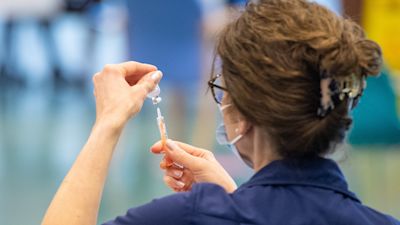Covid vaccine: Can I still get tested after having the coronavirus jab?

Thousands of mass community testing centres have been set up around the UK to help tackle the spread of coronavirus.
But with the vaccination programme underway, will testing centres become a thing of the past? Or do we need to continue being tested even after we've had the jab?
Life after the Covid jab: what you can and cannot do after getting the vaccine
How many people have been vaccinated in the UK and when will I get it?
Public health officials say it's important that people who've had the Covid jab continue to get themselves tested for the virus.
One in three people with Covid-19 don't realise they have it, and officials say asymptomatic testing needs to become part of everyday life.
Information from the Public Health Agency and Government website states that:
Immunity is not instant
It can take up to a few weeks for the vaccine to protect you.
It will take a period of time for your body to produce the antibodies needed to produce an effective immune response to fight future Covid-19 infection.
Therefore it's important for people to continue to listen to the current public health advice, even after having the vaccine.
Covid: Almost half of over-80s ‘broke lockdown rules’ after second jab, survey suggests
You could still spread the virus
The purpose of the vaccine is to prevent you from getting coronavirus, which should reduce the chances of you being able to spread the infection by becoming ill.
However, as the vaccine is new it's not yet clear if the jab will prevent people carrying the virus in their noses and throats after vaccination.
No vaccine provides 100% protection
The current vaccines have demonstrated a high level of protection against coronavirus - but no vaccine provides 100% protection.
Having the vaccine doesn’t completely stop everyone from getting coronavirus but if you do still catch the disease then it shouldn’t make you as poorly.
And as more people in the population are vaccinated with an effective vaccine, the risks of circulating the virus should decrease.
Covid: More than 90% of over 65s have been vaccinated, figures suggest
Duration of protection is still unknown
The duration of protection remains unknown, and further doses may be necessary.
The vaccination programme could be required to run annually, like the flu jab, or every other year.
Testing will help determine vaccine success
PCR tests will be used as part of the vaccine effectiveness assessment in those who are vaccinated and subsequently develop symptoms of Covid-19.
Modified Covid vaccines for variants could be fast-tracked and approved quickly in UK
The vaccine won't affect your Covid test
They do not affect a PCR swab test. They also do not affect the results of lateral flow testing.
Isolate if you've been in contact with a positive case
As the vaccine is new it has not yet been possible to establish if it will prevent the spread of the virus.
Therefore if you are a household contact of or are advised by Contact Tracing or the STOPCOVID NI App that you have been in close contact with someone who has tested positive, you need to self-isolate.
Seven symptoms should trigger a Covid test, new evidence shows - so what are they?
John Giblin from Heanor in Derbyshire has had both Covid vaccinations but is continuing to get tested.
Director of Public Health, Dean Wallace, says continued testing will be key in preventing future lockdowns.
For more information on the vaccine:
Getting the facts: